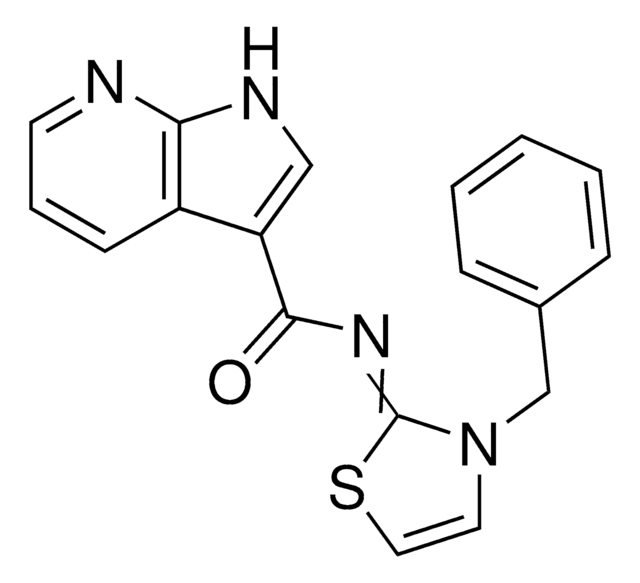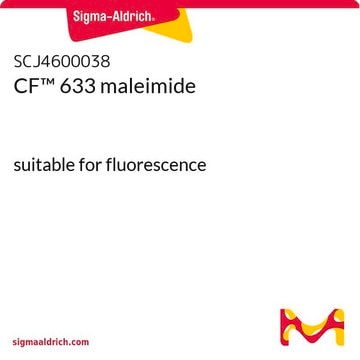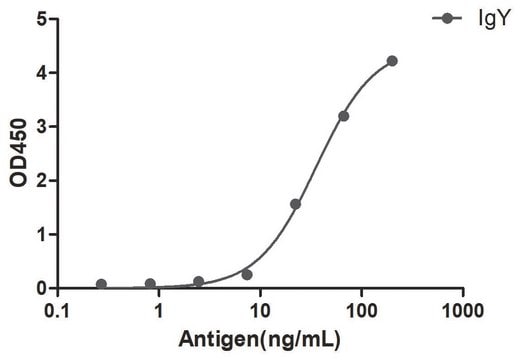SCJ4600037
CF™ 633 hydrazide
suitable for fluorescence, ≥90% (HPLC)
Sign Into View Organizational & Contract Pricing
All Photos(1)
About This Item
UNSPSC Code:
12352203
NACRES:
NA.41
Recommended Products
Assay
≥90% (HPLC)
form
solid
mol wt
~835 g/mol
solubility
H2O: soluble
ε (extinction coefficient)
100000 at 630 nm
absorbance ratio
A280/630 nm 0.48
fluorescence
λex 633 or 635 nm (Flow cytometry laser line)
λex 633 or 635 nm (Microscopy laser line)
λex 630 nm; λem 650 nm
suitability
suitable for fluorescence
storage temp.
−20°C
General description
Far-red fluorescent dyes offer the advantage of ultra sensitive detection because background signal due to autofluorescence in most biological samples is minimal in this spectral region. For many years, the cyanine dye Cy®5 has been the dye of choice for such detection. More recently, Alexa Fluor™ 647 has been developed as a better alternative by having brighter fluorescence and higher photostability. Despite the improvement, Alexa Fluor™ 647 still lacks sufficient photostability required for many demanding applications. On the other hand, while Alexa Fluor™ 633 is photostable, its fluorescence on proteins is very weak. In fact, it has been a challenging task for dye chemists to develop a far-red fluorescent dye that is both highly fluorescent and photostable for protein and nucleic acid labeling. Using new chemistry, scientists at Biotium have successfully developed a series of far-red and near-IR dyes to overcome these challenges. With its absorption peak at 630 nm, CF™633 can be optimally excited by the 633 nm He-Ne laser or the 635 nm red diode laser with emission maximum at 650 nm. Despite its shorter emission wavelength, which often is not favored by a Cy®5-based detection window on most instruments, CF™633 is still significantly brighter than Alexa Fluor™ 647. However, for detections using non-laser-based excitation and a Cy®5 filter set, the full advantage of CF™633 will not be realized. In this case, we recommend CF™640R, another outstanding far-red CF™ dye that is spectrally closer to Cy®5 or other similar cyanine-based dyes. The most important advantage of CF™633 and other rhodamine-based far-red CF™ dyes are their unmatched photostability. The combination of superior brightness and photostability makes far-red CF™ dyes ideal choices for detections in the long wavelength region on a variety of instruments.
CF™ dye hydrazides can be used as a fixable polar tracers for visualizing cell morphology,or for gap junction studies. The dyes can be introduced into cells by microinjection. For conjugation to aldehyde or ketone groups (such as carbohydrate molecules after peroxidation with periodate) we recommend using the more reactive CF aminooxy dye forms.
CF™ dye hydrazides can be used as a fixable polar tracers for visualizing cell morphology,or for gap junction studies. The dyes can be introduced into cells by microinjection. For conjugation to aldehyde or ketone groups (such as carbohydrate molecules after peroxidation with periodate) we recommend using the more reactive CF aminooxy dye forms.
Features and Benefits
1. Yields the brightest anibody conjugates among spectrally similar dyes when excited by the 633 nm He-Ne laser or the 635 nm red diode laser. 2. Far more photostable than Alexa Fluor™647. 3. Highly water-soluble.
Preparation Note
Protect from light
Reconstitution
Dissolve in water
Legal Information
This product is distributed by Sigma-Aldrich Co. under the authorization of Biotium, Inc. This product is covered by one or more US patents and corresponding patent claims outside the US patents or pending applications owned or licensed by Biotium, Inc. including without limitation: 12/334,387; 12/607,915; 12/699,778; 12/850,578; 61/454,484. In consideration of the purchase price paid by the buyer, the buyer is hereby granted a limited, non-exclusive, non-transferable license to use only the purchased amount of the product solely for the buyer′s own internal research in a manner consistent with the accompanying product literature. Except as expressly granted herein, the sale of this product does not grant to or convey upon the buyer any license, expressly, by implication or estoppel, under any patent right or other intellectual property right of Biotium, Inc. Buyer shall not resell or transfer this product to any third party, or use the product for any commercial purposes, including without limitation, any diagnostic, therapeutic or prophylactic uses. This product is for research use only. Any other uses, including diagnostic uses, require a separate license from Biotium, Inc. For information on purchasing a license to use this product for purposes other than research, contact Biotium, Inc., 3159 Corporate Place, Hayward, CA 94545, Tel: (510) 265-1027. Fax: (510) 265-1352. Email: btinfo@biotium.com.
ALEXA FLUOR is a trademark of Life Technologies
CF is a trademark of Biotium, Inc.
Cy is a registered trademark of Cytiva
Disclaimer
Unless otherwise stated in our catalog or other company documentation accompanying the product(s), our products are intended for research use only and are not to be used for any other purpose, which includes but is not limited to, unauthorized commercial uses, in vitro diagnostic uses, ex vivo or in vivo therapeutic uses or any type of consumption or application to humans or animals.
Storage Class Code
11 - Combustible Solids
WGK
WGK 3
Flash Point(F)
Not applicable
Flash Point(C)
Not applicable
Certificates of Analysis (COA)
Search for Certificates of Analysis (COA) by entering the products Lot/Batch Number. Lot and Batch Numbers can be found on a product’s label following the words ‘Lot’ or ‘Batch’.
Already Own This Product?
Find documentation for the products that you have recently purchased in the Document Library.
Sun-Hui Xia et al.
The Journal of neuroscience : the official journal of the Society for Neuroscience, 40(37), 7119-7132 (2020-08-09)
The nucleus accumbens shell (NAcSh) regulates emotional and motivational responses, a function mediated, in part, by integrating and prioritizing extensive glutamatergic projections from limbic and paralimbic brain regions. Each of these inputs is thought to encode unique aspects of emotional
Our team of scientists has experience in all areas of research including Life Science, Material Science, Chemical Synthesis, Chromatography, Analytical and many others.
Contact Technical Service








